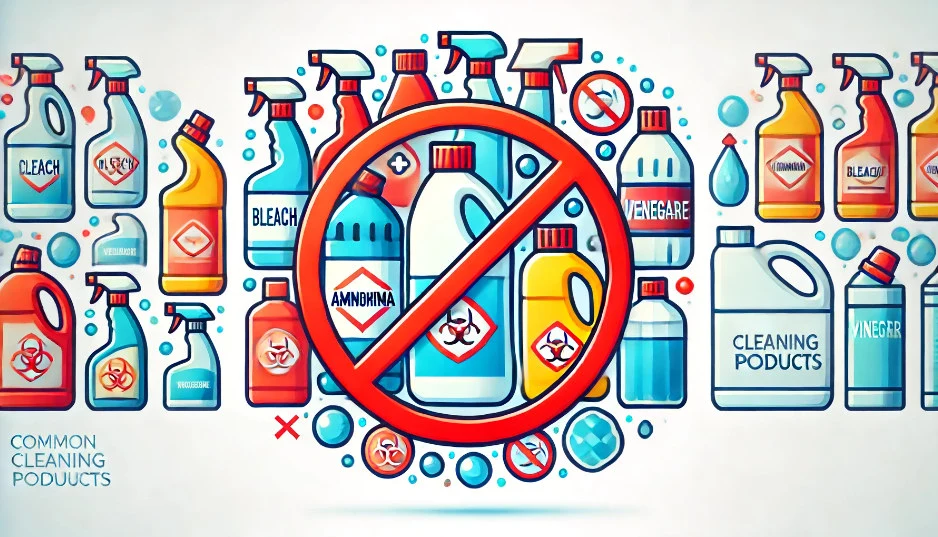Cleaning our homes is essential, but did you know that mixing certain household chemical cleaners can be dangerous? After some calls with commercial cleaning companies in Richmond, Melbourne AU, we found that most of them had already changed their cleaning solutions from chemicals to Eco-Friendly, considering the harmfulness of the chemicals for their workers and the Environment. Let’s explore why this is harmful and how you can clean safely.

Common Household Chemicals
Household cleaners such as bleach, ammonia, vinegar, and hydrogen peroxide are commonly used. Each has its purpose:
- Bleach: Great for disinfecting.
- Ammonia: Powerful degreaser.
- Vinegar: Effective for removing mineral deposits.
- Hydrogen Peroxide: Useful for antiseptic cleaning.
Chemical Reactions and Hazards
Mixing these chemicals can lead to harmful reactions. For instance, combining bleach and ammonia produces toxic chloramine vapours, which can cause respiratory issues. According to the Skokie Fire Department, “Mixing bleach and ammonia can create dangerous chloramine fumes.”
- Bleach + Ammonia: Toxic chloramine vapors
- Bleach + Vinegar: Chlorine gas, highly irritating to the eyes and lungs
Real-life incidents, such as those detailed in the National Center for Biotechnology Information study, highlight the severity of these reactions.
Health Risks
Immediate health risks from inhaling toxic fumes include coughing, shortness of breath, chest pain, and irritation of the eyes, nose, and throat. Long-term exposure can lead to chronic respiratory issues like asthma. The American Lung Association states, “VOCs and other chemicals released from cleaning products can contribute to chronic respiratory problems, allergic reactions, and headaches.”
- Immediate effects: Respiratory issues, skin irritation, eye damage
- Long-term effects: Chronic respiratory conditions, asthma
Safe Cleaning Practices
To avoid these hazards:
- Read Labels: Always read and follow product labels.
- Ventilation: Ensure proper ventilation by opening windows or using fans.
- Alternative Solutions: Use safer alternatives like vinegar and baking soda.
For example, a mixture of vinegar and baking soda can be an effective and safe cleaner for many surfaces.
Environmental Impact
Chemical cleaners can also negatively affect the environment. VOCs and other pollutants can degrade indoor air quality and contribute to outdoor pollution. The American Lung Association points out, “Chemicals released from cleaning products can contribute to indoor air pollution and exacerbate asthma and other respiratory illnesses.”
- Pollutants and VOCs: Impact indoor and outdoor air quality
- Eco-Friendly Choices: Choose environmentally friendly products
Legal and Regulatory Information
There are regulations in place regarding the labelling and use of household chemicals to protect consumers. Staying informed about these regulations and following them is essential to prevent accidents and health hazards.
Impact on the Commercial Cleaning Industry
In the commercial cleaning industry, the risks of mixing chemicals are well-known and strictly managed. Professional cleaners are trained to use products safely, often following strict guidelines to ensure no harmful mixtures occur. This industry relies on detailed knowledge of chemical interactions to maintain safe and clean environments in workplaces, schools, and public spaces. By adhering to these safety standards, the commercial cleaning sector sets an example for safe cleaning practices at home.
Conclusion
Mixing household cleaners is not just ineffective; it can be dangerous. By understanding the risks and following safe practices, you can protect your health and the environment. Always read labels, use proper ventilation, and consider safer alternatives for your cleaning needs.
You may also read: Dangers of Mixing Household Chemical Cleaners

Jessi is the creative mind behind The Coffee Mom, a popular blog that combines parenting advice, travel tips, and a love for all things Disney. As a trusted Disney influencer and passionate storyteller, Jessi’s authentic insights and relatable content resonate with readers worldwide.
